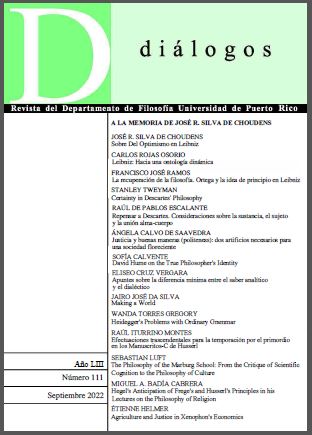Abstract
This paper aims at showing that David Hume outlines the identity of the true philosopher by means of two distinctions: the first one confronts two ways of considering our experience, which reveals an underlying difference between a pre-reflective and a reflective attitude. The second one concerns two parts of humankind that appear to be incompatible: the contemplative and the active, which the true philosopher aims at mediate. The identity thus proposed results in two original contributions: on the one hand, it motivates philosophers to deal with topics focused on common life. On the other hand, it suggests philosophers are notexclusively endowed with a reflective attitude, rather, this attitude is shared with anyone who is an expert on any other occupation. Neither is the philosophical identity assumed once and for all. On the contrary, it is adopted at certain times and places, and alternates with the pre-reflective attitude.

This work is licensed under a Creative Commons Attribution-NonCommercial 4.0 International License.

